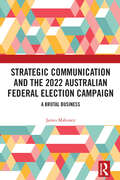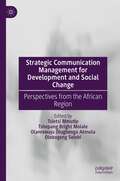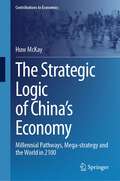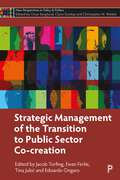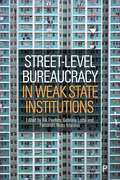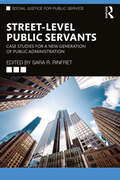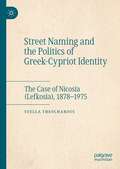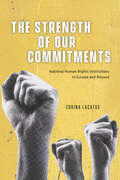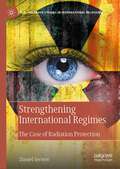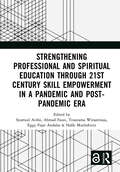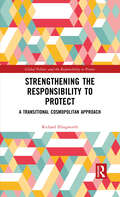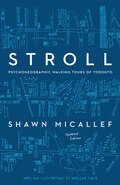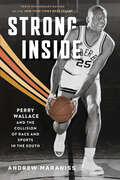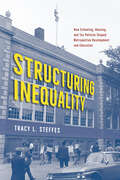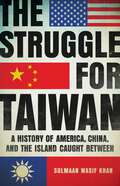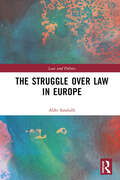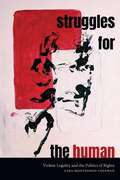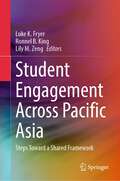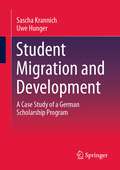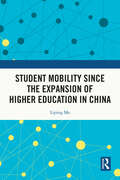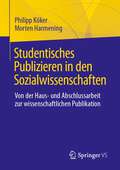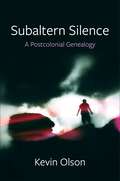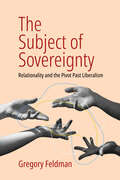- Table View
- List View
Strategic Communication and the 2022 Australian Federal Election Campaign: A Brutal Business
by James MahoneyThis book presents a new approach to the analysis of Australian federal election campaigns, approaching them from a professional communication perspective. It stress-tests the campaigns of the major parties against the requirements of effective strategic communication planning and implementation parameters used in professional practice.Research undertaken during the 2022 election period analyses campaign issues, whether communication tools were appropriate, and whether strategic directions led to real outcomes by delivering votes to the parties. Applying the Hallahan model for the first time in an Australian election study, the book offers rare insights into a political culture that employs compulsory voting. It will be of interest to scholars and students of Australian politics, public relations, and communication studies.
Strategic Communication Management for Development and Social Change: Perspectives from the African Region
by Tsietsi Mmutle Tshepang Bright Molale Olanrewaju Olugbenga Akinola Olebogeng SelebiThis book is the first of its kind within the African region to combine scholarly perspectives from the fields of Strategic Communication Management and Communication for Development and Social Change. It draws insights from scholars across the African continent by unravelling the complementary nature of scholarship between the two fields, through the lens of prevailing governance and sustainability challenges facing African countries, today. This edited volume covers issues that have adversely affected the achievement of goals related to humanitarian upliftment, development and social change for all African nations. Consequently, citizen participation, which lies at the heart of these challenges when considering the question of sustainable governance and policy development for social change in an African context is addressed. To this end, a reflection is also made on various case studies that exist where local citizens do not inform sustainable development programmes, while the promotion of bottom-up development and social change is largely replaced by top-down instrumental action approaches and hemispheric communication instead of strategic communication. Themes explored include: ● Communication for social change, bottom-up development and social movements in the local government sphere ● Strategic communication in governance, planning and policy reforms ● The role of multi-stakeholder partnerships in achieving development of objectives geared towards good governance in Africa ● Public participation, protests, and resistance from 'below' ● Public sector health communications and development ● Media relations, accountability and contested development narratives with the Fourth Estate ● Social media and eParticipation in government development programs.
The Strategic Logic of China’s Economy: Millennial Pathways, Mega-strategy and the World in 2100 (Contributions to Economics)
by Huw McKayThis book reviews China’s strategic pathway over the last 1000 years and considers its prospects for ascending to high-income status by the end of the 21st century. It analyzes why, although China’s chances of joining the global core are sound, they are not outstanding; in addition, it faces mounting challenges, internal and external alike. The argument is presented in the framework of dynamic-strategy theory, which is expounded here in novel form. This exposition includes a wide ranging survey of global history, with a focus on the development of the industrialisation paths of the major economies of today, including a detailed study of Japan's long-run strategic pathway. The book’s closing section presents a scenario-based discussion of China’s potential place in the world in 2100. The analysis implies that China’s zenith is likely to be reached slightly before mid-century, after which its relative economic scale will likely decline. Beyond that general finding, the scenarios investigate the wide range of plausible outcomes that China may experience: a range that the author contends is much wider for China than for nations under-pinned by less complex political-economies. Given its scope, the book will appeal to scholars of history, economics, geopolitics and sinology, and to anyone interested in learning about China’s economic prospects at a time of increasingly heated ideological and empirical debates.
Strategic Management of the Transition to Public Sector Co-Creation
by Jacob Torfing, Ewan Ferlie, Tina Jukić and Edoardo OngaroAs the practices of public governance are rapidly changing, so must the theoretical frameworks for understanding the creation of efficient, effective and democratic governance solutions. First published as a special issue of Policy & Politics journal, this book explores the role of strategic management, digitalisation and generative platforms in encouraging the co-creation of innovative public value outcomes. It considers why we must transform the public sector to drive co-creation and the importance of integrating different theoretical strands when studying processes, barriers and outcomes. This book lays out important stepping-stones for the development of new research into the ongoing transition to co-creation as a mode of governance.
Strategischer Wettbewerb im Weltraum: Politik, Recht, Sicherheit und Wirtschaft im All (Sicherheit, Strategie & Innovation)
by Antje Nötzold Enrico Fels Andrea Rotter Moritz BrakeDer Sammelband nimmt erstmalig seit Ende des Kalten Krieges für den deutschsprachigen Raum eine komprimierte Bestandsaufnahme der aktuellen Aktivitäten, rechtlichen Rahmenbedingungen, politischen und militärischen Konfliktlinien und Kooperationsräume sowie weiterführender Trends und Herausforderungen im Weltraum vor. Dabei werden zum einen die rechtlichen, militärischen, wirtschaftlichen und technologischen Herausforderungen des Bedeutungszuwachses dieses strategisch gewichtigen Raumes analysiert. Zum anderen werden Handlungsfähigkeit und -bedarf ausgewählter Weltraummächte, ihre Kooperationsmöglichkeiten und Konfliktpotenziale sowie der internationale politische Regulierungsbedarf herausgearbeitet und darauf aufbauend politische Handlungsempfehlungen dargelegt.„Eine hervorragend gelungene Bestandsaufnahme der umfassenden Bedeutung des Weltraums.“ Prof. Dr. Dr. h. c. Karl Kaiser, Harvard University
Street-Level Bureaucracy in Weak State Institutions
by Rik Peeters, Gabriela Lotta, and Fernando Nieto-MoralesIn this book, street-level bureaucracy scholars from South Asia, sub-Saharan Africa, the Middle East, and Latin America analyse the conditions that shape frontline work and citizens´ everyday experience of the state. Institutional factors such as political clientelism, resource scarcity, social inequality, job insecurity, and systemic corruption affect the way street-level bureaucrats enforce rules and implement policies. Inadvertently, they end up implementing inequities in citizens’ access to rights and services — despite efforts to repair organisational deficiencies and broker relations between vulnerable citizens and a distant state. This book illuminates these realities and challenges and provides unique insights into critical themes such as resource scarcities, bureaucratic corruption, control practices, and the complexities of dealing with vulnerable population groups.
Street-Level Public Servants: Case Studies for a New Generation of Public Administration (Social Justice for Public Service)
by Sara R. RinfretThis cutting-edge new casebook challenges the dominant White-centric narrative of public administration, offering a fresh array of perspectives, with the lofty aim of ending the marginalization of communities in public policy implementation. Contributors adopt a liberatory framework to examine street-level public administrators (e.g., teachers, security officers, policy analysts, and human resource experts) most responsible for implementing public policy in the United States, including and amplifying previously unrecognized narratives on the front lines of public administration. Case studies explore real-life public servants, not traditionally heard of, offering counter-narratives. Each chapter concludes with an empowerment exercise and assignment for faculty to adopt in their classroom. This edited volume, a first of its kind, is written by experts in public policy and administration, bringing together top and emerging scholars in one volume to amplify underrepresented voices in public administration and policy. Chapters are rooted in qualitative approaches and center the narratives of marginalized communities, including women, People of Color, and LGBTQIA+ public servants. Street-Level Public Servants offers a much-needed casebook for public administration and public policy courses in the twenty-first century.
Street Naming and the Politics of Greek-Cypriot Identity: The Case of Nicosia (Lefkosia), 1878–1975
by Stella TheocharousThis book is the first to explore street names and street-naming in the formation of a Greek-Cypriot identity in the cityscape of Nicosia between 1878 and 1975. Rather than treating toponymy as a direct linguistic act of spatial orientation, the book approaches street-naming as a contested practice involving those shared symbols and representations used to depict official history and collective identity as part of a political process. It considers how street names are part of the symbolic politics of space, and how authorities transformed the streets of Nicosia into arenas of struggle for the control of symbolic and material space. It documents historical efforts over the course of a century to impose a ‘geography of forgetting’ to buttress national identity and to cast out the ‘other’ from space — both literally and symbolically — so as to achieve territorial dominance and political legitimacy. The book is another step towards the development of a global perspective on the critical study of street-naming, thereby refining and expanding our knowledge of the political dynamics involved in the process. In their commemorative capacity, street names belong to the politics of public memory and identity.
The Strength of Our Commitments: National Human Rights Institutions in Europe and Beyond (Chicago Series on International and Domestic Institutions)
by Corina LacatusA deep dive into the mechanics of national human rights institutions and the forces that make or break their success. In the years since World War II, the endeavor to promote human rights has gained momentum and become increasingly important within international relations. Yet these efforts often run into serious problems of enforcement. Many countries formed national human rights institutions (NHRIs) with independent mandates to support and monitor government compliance with international human rights law. Be they commissions, ombudsmen, or tribunals, these institutions vary in their power and impact. For this book, Corina Lacatus surveyed NHRIs in Europe and around the world to determine their effectiveness and explain why some succeed while others fail. The Strength of Our Commitments explores the relationship between the domestic and international support an institution receives and its ability to secure resources, credibility, and tangibly improve human rights conditions. Lacatus shows that NHRIs can be models of resilience, even in the face of opposition from political elites. Although their impact on human rights is difficult to measure, The Strength of Our Commitments shows how NHRIs’ strength comes from clearly defined formal powers, strong institutional leadership, and independence from political interference.
Strengthening International Regimes: The Case of Radiation Protection (Palgrave Studies in International Relations)
by Daniel SerwerThis book is intended to examine the history of radiation protection up to the present from the perspective of regime theory, with a view to elucidating what this case teaches about how a strong regime in a controversial area can form and maintain itself. This is a particularly relevant issue at present when the overall international rules-based order is under threat and scientific authority doubted. There are significant parallels between the international radiation protection regime and efforts to slow climate change, stop the proliferation of nuclear weapons, manage the applications of artificial intelligence, control the use of drones, and confront the risks posed by pandemics. While each has its own dynamics, all these issues involve the interaction of scientific discovery and expertise with the societies that generate them. Learning what works and what does not is vital if we are to limit harm and ensure survival of humanity on a shrinking and warming planet.
Strengthening Professional and Spiritual Education through 21st Century Skill Empowerment in a Pandemic and Post-Pandemic Era: Proceedings of the 1st International Conference on Education (ICEdu 2022), September 28, 2022, Malang, Indonesia
by Syamsul Arifin Ahmad Fauzi Triastama Wiraatmaja Eggy Fajar Andalas Nafik MuthohirinDiscover a treasure trove of knowledge in the proceedings of the First International Confer-ence on Education (ICEdu). This meticulously curated collection of research papers delves into the transformative landscape of education in the 21st century, offering insights, solutions, and inspiration for educators, researchers, and policymakers alike.Explore a diverse range of subject areas, from pedagogical innovations to the challenges of digital learning and the impact of the COVID-19 pandemic on education. With 28 scholarly papers contributed by experts from around the world, this volume offers a comprehensive un-derstanding of the multifaceted issues in contemporary education.Whether you're an academic seeking fresh perspectives or an educator navigating the com-plexities of modern pedagogy, these proceedings provide invaluable guidance. Join us in shap-ing the future of education by harnessing the power of 21st-century skills, professional devel-opment, and spiritual growth.This book is an essential resource for anyone passionate about the advancement of education in the pandemic and post-pandemic era.The Open Access version of this book, available at http://www.taylorfrancis.com, has been made available under a Creative Commons Attribution-Non Commercial-No Derivatives (CC-BY-NC-ND) 4.0 license. Funded by Universitas Muhammadiyah Malang, Indonesia.
Strengthening the Responsibility to Protect: A Transitional Cosmopolitan Approach (Global Politics and the Responsibility to Protect)
by Richard IllingworthThis book provides a systematic analysis of reform measures aimed at strengthening the implementation of the ‘Responsibility to Protect’ (R2P) doctrine, utilising a cosmopolitan lens. In 2005, member states of the United Nations (UN) accepted a ‘Responsibility to Protect’ against four mass atrocity crimes: genocide, crimes against humanity, war crimes, and ethnic cleansing. Despite this commitment, mass atrocities remain a pervasive aspect of the international landscape. In addressing R2P reform, the book utilises a ‘transitional cosmopolitan’ lens. The aim of this transitional cosmopolitan approach is to promote incremental progress towards solving moral problems by operating within particular contexts and practical barriers to change. Three areas for reform are explored: the UN Security Council P5’s power of veto, to prevent the veto obstructing timely and decisive R2P response action; the powers of the UN General Assembly as an alternative means for responding to mass atrocity situations; and the establishment of an ‘R2P Commission’ to hold states accountable for their R2P commitments. These are not advocated as the definitive areas for R2P reform. However, each of the recommendations made can contribute at least some positive progress towards a more cosmopolitan application of the R2P that would help in curbing mass atrocity and improving the protection of fundamental human rights. This book will be of much interest to students of the Responsibility to Protect, genocide, humanitarian protection, and International Relations in general.
Stroll, updated edition: Psychogeographic Walking Tours Of Toronto
by Shawn MicallefTHE TORONTO STAR'S "30 BOOKS WE CAN'T WAIT TO READ THIS SPRING"The updated edition of a Toronto favourite meanders around some of the city’s unique neighborhoods and considers what makes a city walkable What is the 'Toronto look'? Glass skyscrapers rise beside Victorian homes, and Brutalist apartment buildings often mark the edge of leafy ravines, creating a city of contrasts whose architectural look can only be defined by telling the story of how it came together and how it works, today, as an imperfect machine.Shawn Micallef has been examining Toronto’s streetscapes for decades. His psychogeographic reportages situate Toronto's buildings and streets in living, breathing detail, and tell us about the people who use them; the ways, intended or otherwise, that they are being used; and how they are evolving.Stroll celebrates Toronto's details – some subtle, others grand – at the speed of walking and, in so doing, helps us to better get to know its many neighbourhoods, taking us from well-known spots like the CN Tower and Pearson Airport to the overlooked corners of Scarborough and all the way to the end of the Leslie Street Spit in Lake Ontario."Shawn Micallef is the unofficial mayor of Toronto, the genial ambassador the city needs and deserves. As he strolls Toronto’s broad avenues and its little streets, he finds hidden pockets of delight – and weirdness, too. Join him and fall in love with the city again." – Liz Renzetti, author of Bury the Lead"When I moved to Toronto in 2011, Stroll was the first book I added to my library and course reading lists. My students and I get lost in the PATH, sneak into lobbies, and visit the archives with this book as our guide. Micallef’s friendly voice invites us to slow down and notice not just a few landmark buildings but the city’s built fabric as a whole. This updated version offers our collective memory a much-needed affectionate yet critical view of recent changes to the city." – Erica Allen-Kim, Author of Building Little Saigon"Stroll is a delightful and eccentric guidebook, full of clever writing, amusing stories and charming maps that will make you want to strap on your walking shoes and head into the streets of Toronto." – Carol Off, Author/Broadcaster"Shawn Micallef looks at the city in a way we all should more often – he sees it as a living book that is alive with stories just waiting to be told to the attentive observer. In Stroll, he gives us an introduction to just how interesting and surprisingly dramatic those stories are, and how exciting our city is when we hear them." – David Crombie, former mayor of Toronto"A smart and intimate guide to the city that makes you feel like an insider from start to finish." – Douglas CouplandThis new edition updates things in the city that have changed and includes several new walks.
Strong Inside: Perry Wallace and the Collision of Race and Sports in the South
by Andrew MaranissNew York Times Best Seller2015 RFK Book Awards Special Recognition2015 Lillian Smith Book Award2015 AAUP Books Committee "Outstanding" Title When Strong Inside was first published ten years ago, no one could have predicted the impact the book would have on Vanderbilt University, Nashville, and communities across the nation. What began as a biography of Perry Wallace—the first African American basketball player in the Southeastern Conference (SEC)—became a catalyst for meaningful change and reconciliation between Wallace and the city that had rejected him. In this tenth-anniversary edition, scholars of race and sports Louis Moore and Derrick E. White provide a new foreword that places the story in the context of the study of sports and society, and author Andrew Maraniss adds a concluding chapter filling readers in on how events unfolded between Strong Inside&’s publication in 2014 and Perry Wallace&’s death in 2017 and exploring Wallace&’s continuing legacy. Wallace entered kindergarten the year that Brown v. Board of Education upended &“separate but equal.&” As a twelve-year-old, he sneaked downtown to watch the sit-ins at Nashville&’s lunch counters. A week after Martin Luther King Jr.&’s &“I Have a Dream&” speech, Wallace entered high school, and later saw the passage of the Civil Rights and Voting Rights acts. On March 19, 1966, his Pearl High School basketball team won Tennessee&’s first integrated state tournament—the same day Adolph Rupp&’s all-white Kentucky Wildcats lost to the all-Black Texas Western Miners in an iconic NCAA title game. The world seemed to be opening up at just the right time, and when Vanderbilt recruited him, Wallace courageously accepted the assignment to desegregate the SEC. His experiences on campus and in the hostile gymnasiums of the Deep South turned out to be nothing like he ever imagined.
Structured Discovery Cane Travel Approach to Orientation and Mobility Concepts
by Merry-Noel ChamberlainStructured Discovery Cane Travel Approach to Orientation and Mobility Concepts is a collection of skill-building fundamental techniques essential to develop mobility independence for students who are blind or visually impaired. This book dives into transformational mobility concepts followed by a trove of tried-and-true necessary and efficient activities to enhance students’ abilities to improve problem-solving skills within natural environments while using a long white cane with a metal tip as the primary mobility tool. Since Structured Discovery Cane Travel is individualized, this activity-based collection may be used to enhance introduction to and/or assistance with on-going education of comprehending complicated concrete and abstract Orientation and Mobility concepts to help achieve independent mobility. Structured Discovery Cane Travel Approach to Orientation and Mobility Concepts focuses on encouraging students to develop intrinsic knowledge and abilities through this plethora of activity-based transformational approaches to target individual objectives. These activities logically transpire through direct exposure and/or teachable moments to hand-on experiences to help students create mental mapping skills of their surroundings which can then be utilized in novel or unfamiliar environments. Used in conjunction with The ABCs of Structured Discovery Cane Travel for Children, by Merry-Noel Chamberlain, parents and instructors of children who are blind or visually impaired will be able to comprehend and instruct O&M essentials using this vault of O&M activities.
Structuring Inequality: How Schooling, Housing, and Tax Policies Shaped Metropolitan Development and Education
by Tracy L. SteffesHow inequality was forged, fought over, and forgotten through public policy in metropolitan Chicago. As in many American metropolitan areas, inequality in Chicagoland is visible in its neighborhoods. These inequalities are not inevitable, however. They have been constructed and deepened by public policies around housing, schooling, taxation, and local governance, including hidden state government policies. In Structuring Inequality, historian Tracy L. Steffes shows how metropolitan inequality in Chicagoland was structured, contested, and naturalized over time even as reformers tried to change it through school desegregation, affordable housing, and property tax reform. While these efforts had modest successes in the city and the suburbs, reformers faced significant resistance and counter-mobilization from affluent suburbanites, real estate developers, and other defenders of the status quo who defended inequality and reshaped the policy conversation about it. Grounded in comprehensive archival research and policy analysis, Structuring Inequality examines the history of Chicagoland’s established systems of inequality and provides perspective on the inequality we live with today.
The Struggle for Taiwan: A History of America, China, and the Island Caught Between
by Sulmaan Wasif KhanA concise, definitive history of the precarious relationship among the US, China, and Taiwan As tensions over Taiwan escalate, the United States and China stand on the brink of a catastrophic war. Resolving the impasse demands we understand how it began. In 1943, the Allies declared that Japanese-held Taiwan would return to China at the conclusion of World War II. The Chinese civil war led to a change of plans. The Communist Party came to power in China and the defeated Nationalist leader, Chiang Kai-shek, fled to Taiwan, where he was afforded US protection. The specter of conflict has loomed ever since. In The Struggle for Taiwan, Sulmaan Wasif Khan offers the first comprehensive history of the triangular relationship between the United States, China, and Taiwan, exploring America&’s ambivalent commitment to Taiwan&’s defense, China&’s bitterness about the separation, and Taiwan&’s impressive transformation into a flourishing democracy. War is not inevitable, Khan shows, but to avoid it, decision-makers must heed the lessons of the past. From the White Terror to the Taiwan Straits Crises, from the normalization of Sino-American relations to Trump-era rising tensions, The Struggle for Taiwan charts the paths to our present predicament to show what futures might be possible.
The Struggle over Law in Europe (ISSN)
by Aldo SandulliThis book examines the role of law in Europe at a time when economic policies have become dominant not only on this continent but globally. Can law be seen as a mere infrastructure? Or does it contribute to defining the social and legal order through its own inherent rules? If the second hypothesis is true, what might these rules be, and how may they be identified? Lastly, to what extent can agreeing a definition of the role of law affect the future of Europe? With the Next Generation European Union, the EU has introduced an unprecedented investment plan for economic recovery and resilience. In doing so, it has become the most important financial intermediary on the continent. But is this simply the prelude to a European economic and financial revival, or does it also aim to strengthen the European legal order in social, political, and constitutional terms? This book argues that the role of law in Europe should be to achieve a balanced relationship between freedom and solidarity; encouraging economic competition, but also social cohesion. Analyzing the role of law in the project of European integration, it maintains that law should be more than an infrastructure for finance and economics, showing how it can act as a guide and a binding force to achieve a more balanced relationship between economics, politics, and law. This book will be of interest to scholars in the fields of public law, European law, law and economics, the philosophy of law, legal history, political theory, and political science, as well as others concerned with the future of European integration.
Struggles for the Human: Violent Legality and the Politics of Rights (Global and Insurgent Legalities)
by Lara Montesinos ColemanIn Struggles for the Human, Lara Montesinos Coleman blends ethnography, political philosophy, and critical theory to reorient debates on human rights through attention to understandings of legality, ethics, and humanity in anticapitalist and decolonial struggle. Drawing on her extensive involvement with grassroots social movements in Colombia, Coleman observes that mainstream expressions of human rights have become counterparts to capitalist violence, even as this discourse disavows capitalism’s deadly implications. She rejects claims that human rights are inherently tied to capitalism, liberalism, or colonialism, instead showing how human rights can be used to combat these forces. Coleman demonstrates that social justice struggles that are rooted in marginalized communities’ lived experiences can reframe human rights in order to challenge oppressive power structures and offer a blueprint for constructing alternative political economies. By examining the practice of redefining human rights away from abstract universals and contextualizing them within concrete struggles for justice, Coleman reveals the transformative potential of human rights and invites readers to question and reshape dominant legal and ethical narratives.
Student Engagement Across Pacific Asia: Steps toward a Shared Framework
by Luke K. Fryer Ronnel B. King Lily M. ZengStudent engagement at the programme and university levels are both critical to students' success in higher education. This book establishes a theoretical and empirical framework for assessing these student experiences together. To this end, the book brings together the two major fields of university quality assurance (US [university engagement] and UK [programme experiences]). This edited book then shows how this integrated approach applies to university experiences across Pacific Asia (Hong Kong, Mainland China, Philippines, Korea, Japan, and Taiwan). It demonstrates how the proposed quality assurance framework can be applied as an intra-institutional tool to enhance student experiences. For readers interested in future of Asia Pacific higher education, this book presents a path towards enhanced cross-national communication between Asia Pacific universities.
Student Migration and Development: A Case Study of a German Scholarship Program
by Sascha Krannich Uwe HungerHow do international students and alumni contribute to development in their countries of origin? Is the development effect greatest when students return to their countries of origin directly after completing their studies and become involved locally there, or can they also support the development of their country of origin if they remain abroad after their studies and contribute their knowledge and capital to the development process of their country of origin via transnational networks? Specifically, this question is examined in this publication using the example of the scholarship and alumni work of the Catholic Academic Alien Service (KAAD) in five countries of different developing regions: Georgia, Ghana, Indonesia, Colombia and Palestine.
Student Mobility Since the Expansion of Higher Education in China
by Liping MaThis book examines the characteristics of Chinese college students' mobility since the expansion of higher education by using a nationally representative data set. It analyzes college graduates' mobility from both horizontal and vertical dimensions. The horizontal dimension shows college students' migration directions and location changes, including migration for college, migration for employment, migration for grassroots positions, migration away from the capital, and migration back to their hometown. The vertical dimension includes students' intergenerational occupational mobility and intergenerational regional mobility. Drawing on theories of education and economics, the book provides a solid framework for empirically analyzing the characteristics, causes, and economic and non-economic benefits of different forms of mobility. This book not only offers insights into China's higher education policies and their impact on the regional and intergenerational mobility decisions of college graduates over the past two decades, but also has important implications for countries at similar stages of social and economic development. This book is an excellent read for students and scholars of education, economics, and East Asian studies. It can also help policymakers understand the characteristics of students' mobility and the underlying reasons for their choices, so that they can propose effective policies in the future.
Studentisches Publizieren in den Sozialwissenschaften: Von der Haus- und Abschlussarbeit zur wissenschaftlichen Publikation
by Philipp Köker Morten HarmeningBisher fehlt es an Lehrbüchern, die sich spezifisch mit den Herausforderungen und Chancen des studentischen Publizierens befassen. Der Band will diese Lücke schließen und bietet eine systematische Einführung in den wissenschaftlichen Publikationsprozess aus studentischer Sicht und erläutert den Weg von der Haus- und Abschlussarbeit zur eigenen wissenschaftlichen Publikation. Grundsätzliche Unterschiede zwischen studentischen Qualifikationsarbeiten und wissenschaftlichen Aufsätzen werden ebenso behandelt wie unterschiedliche Publikationsformate, Peer-Review und die Gefahren von Raubverlagen. Weiterhin bietet es eine Schritt-für-Schritt Anleitung für den Weg von der ersten Idee bis zur publizierten Arbeit. Durch zahlreiche Beispiele, Check-Listen und weitere Ressourcen eignet sich das Buch nicht nur für Studierende, die ihre Arbeiten veröffentlichen oder mehr über den wissenschaftlichen Publikationsprozess lernen möchten, sondern auch für Dozierende als Ressource zur Nutzung in Lehrforschungsseminaren und -projekten.
Subaltern Silence: A Postcolonial Genealogy (New Directions in Critical Theory #90)
by Kevin OlsonSubordination did not simply fade away in the aftermath of colonialism. Instead, this illuminating book shows, a host of subtle new techniques have arisen that dominate vast categories of people by rendering them silent. Kevin Olson investigates how contemporary societies silence the subaltern: sometimes a literal silencing, often a metaphor for other ways of making people unheard. Such forms of silence make some people invisible, push others to the margins, and devalue the voices and actions of still others.Subaltern Silence traces the development of these techniques to the early years of European colonialism, focusing on Haiti’s revolution and postcolonial trajectory. Exploring rich archives from Europe and the postcolonial world, Olson critiques fundamental modern institutions and technologies, such as the public sphere, the free press, and even progressively minded democratic revolution, as sites of exclusion. With the emergence of postcoloniality, he argues, subordination has become increasingly abstract, virtual, and symbolic. Nonetheless, it lies at the heart of contemporary racial politics, divides Global South from Global North, and allocates privileges and burdens in ways that are often scarcely perceptible. Engaging deeply with the thought of Gayatri Spivak and Michel Foucault, Subaltern Silence offers a new genealogy of colonialism and postcoloniality that is both historically informed and theoretically rich.
The Subject of Sovereignty: Relationality and the Pivot Past Liberalism
by Gregory FeldmanSeeking new forms of democracy, progressive politics raises a fundamental question: what is the alternative to the allegedly coherent, self-contained liberal subject that represents the project of modernity? Exploring the themes of nature, race, and the divine, this book identifies the more realistic alternative in the “relational subject”: a subject that is inseparable from the global field of relations through which it emerges and yet distinct from that field because it lives a life that no one else ever has. Recognizing ourselves as such subjects allows us not only to rethink politics, but, more profoundly, to envision sovereignty as the means by which we each rejuvenate ourselves and the polities we constitute with others.
